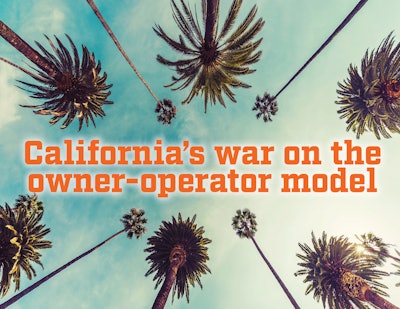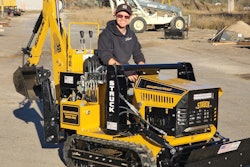 Overdrive explored in January the topic of ABC tests and the threat they pose to the traditional leased-owner-operator model in-depth. Read that coverage here, as well as 2019 in-depth coverage of the issue at this link.
Overdrive explored in January the topic of ABC tests and the threat they pose to the traditional leased-owner-operator model in-depth. Read that coverage here, as well as 2019 in-depth coverage of the issue at this link.Will owner-operators be able to continue to work in California, particularly those that get their loads from other carriers?
That was the question Tuesday before a high-level federal appellate court, where trucking groups argued that motor carriers should remain exempt, at least temporarily, from California’s restrictive A.B. 5 law, which otherwise makes it mostly illegal for carriers to contract loads to owner-operators as independent contractors. Likewise, the state of California presented its case as to why the law should apply to carriers. The Teamsters Union also presented arguments on behalf of the state’s case.
The three-judge panel on the 9th Circuit Court of Appeals that heard the case Tuesday will issue a ruling as to whether carriers and owner-operators will remain exempt from A.B. 5 while the California Trucking Association’s underlying lawsuit against the contractor law proceeds in court. When the ruling will be issued, however, is unclear.
“We’re pleased with how it went,” said attorney Bob Roginson, one of the lead lawyers representing CTA in the case and manager of the Los Angeles office of the national law firm Ogletree, Deakins, Nash, Smoak and Stewart. Roginson heads Ogletree’s transportation and logistics group. “It’s hard to predict with any clarity on where court is headed or what specifically was most important to it. [The judges] had a lot of questions, and I think we handled them very well.”
The 9th Circuit’s decision will likely have years-long ramifications for carriers and independent contractor drivers that work in the state. Ultimately, the lawsuit could take years to make its way through the various courts, potentially all the way to the U.S. Supreme Court — marking the importance of the decision in front of the 9th Circuit in the case heard Tuesday.
No matter which way the 9th Circuit rules, the decision will likely be appealed to be heard “en banc,” or before the entire court — the losing side is likely to request a re-hearing by all 12 judges on the 9th Circuit appellate court. From there, the injunction decision could be appealed to the U.S. Supreme Court.
Next, after a decision is reached about the temporary injunction, the actual lawsuit itself against A.B. 5, in which CTA seeks a permanent exemption for trucking from the A.B. 5 restrictions, will be heard by the U.S. District Court in Southern California. From there, any decision will likely be appealed to the same 9th Circuit Court of Appeals that heard the case Tuesday and then potentially to the U.S. Supreme Court.
Roginson and other CTA attorneys argue that a 1994 federal law, the Federal Aviation Administration Authorization Act, expressly prohibits states from enforcing laws that interfere with “prices, routes and services” of interstate motor carriers. California’s A.B. 5 does just that, CTA argues in its case, and thus should not apply to trucking operations in the state.
Though companies like Uber and Lyft have made headlines recently for losing their court cases against A.B. 5’s impact on their operations, those “gig economy” cases “don’t have any real meaningful impact on how the courts are looking at [CTA’s] case,” said Roginson.








